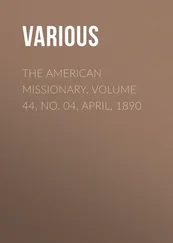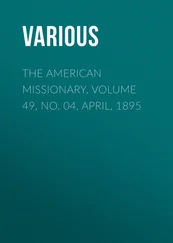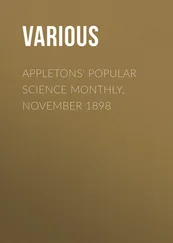Various - Appletons' Popular Science Monthly, April 1899
Здесь есть возможность читать онлайн «Various - Appletons' Popular Science Monthly, April 1899» — ознакомительный отрывок электронной книги совершенно бесплатно, а после прочтения отрывка купить полную версию. В некоторых случаях можно слушать аудио, скачать через торрент в формате fb2 и присутствует краткое содержание. Издательство: Иностранный паблик, Жанр: periodic, foreign_edu, на английском языке. Описание произведения, (предисловие) а так же отзывы посетителей доступны на портале библиотеки ЛибКат.
- Название:Appletons' Popular Science Monthly, April 1899
- Автор:
- Издательство:Иностранный паблик
- Жанр:
- Год:неизвестен
- ISBN:нет данных
- Рейтинг книги:5 / 5. Голосов: 1
-
Избранное:Добавить в избранное
- Отзывы:
-
Ваша оценка:
- 100
- 1
- 2
- 3
- 4
- 5
Appletons' Popular Science Monthly, April 1899: краткое содержание, описание и аннотация
Предлагаем к чтению аннотацию, описание, краткое содержание или предисловие (зависит от того, что написал сам автор книги «Appletons' Popular Science Monthly, April 1899»). Если вы не нашли необходимую информацию о книге — напишите в комментариях, мы постараемся отыскать её.
Appletons' Popular Science Monthly, April 1899 — читать онлайн ознакомительный отрывок
Ниже представлен текст книги, разбитый по страницам. Система сохранения места последней прочитанной страницы, позволяет с удобством читать онлайн бесплатно книгу «Appletons' Popular Science Monthly, April 1899», без необходимости каждый раз заново искать на чём Вы остановились. Поставьте закладку, и сможете в любой момент перейти на страницу, на которой закончили чтение.
Интервал:
Закладка:
The more common form of state monopoly is that which occupies a middle position, established for reasons of public safety or utility as well as of revenue. The salt monopoly enforced in Prussia was only abolished in 1867, and is still maintained in every canton of Switzerland. The strongest plea in its defense has been the guarantee by the state of the purity of the article sold, and this phase of the question has superseded the revenue aspect. Few articles of prime necessity, like salt, are subject to monopolies imposed by the state, and by a process of elimination it is only articles of luxury or voluntary consumption that are regarded as fit objects of monopoly for the benefit of the state.
A tax imposed upon an article at a certain stage of its production or manufacture may enforce the expediency or necessity of a state monopoly. Where the supervision of the state agents must be so close as to interfere with the conduct of the industry, the state intervenes and itself controls the manufacture and sale. Tobacco has long been subject to this fiscal régime , and, proving so productive of revenue, there is little to be said against a monopoly by the state of its manufacture and sale.
In Italy the tobacco monopoly is conceded to a company, but its return of net revenue to the state is nearly as large as the revenue derived from the taxes on real property (about thirty-eight million dollars a year). Prussia imposes a charge on the home-grown tobacco by a tax on the land devoted to its culture, but the return is very small, and Bismarck wished to introduce a true tobacco monopoly, modeled on that of France. But the conditions were opposed to his scheme, for the use of tobacco is general throughout the empire, and a proposition to increase its price by taxation or modify its free manufacture and distribution excited a widespread opposition. France maintains a full monopoly, and finds it too profitable to be lightly set aside unless some equally profitable source of revenue is discovered to make good the loss its abolition would involve.
While historical support is given to the maintenance of a monopoly as in France, it is not probable that the system will find imitators in other states, however tempting the returns obtained might seem. Great Britain has by her insular position solved the problem in another way. By interdicting the domestic cultivation of tobacco, all that is consumed must be imported, and a customs duty offers a ready instrument for making the plant, in whatever form it enters, contribute its dues to the exchequer. In Russia, as in the United States, where tobacco is a domestic product, the tax is imposed upon its manufacture, and this method requires supervision but no monopoly of the state.
The tobacco régime is defended almost entirely on fiscal grounds, and as a monopoly, an extreme measure, has proved its value as an instrument of taxation. Other reasons, of a moral character, are urged to induce the state to monopolize the manufacture and sale of distilled spirits. Both France and Germany have considered this question, and, in spite of confident predictions of a large profit, have decided not to undertake it. Russia, on the other hand, has taken it up quite as much on social as on revenue grounds, and is gradually securing a monopoly of the trade in spirits. The initial cost of the undertaking is large, and, as the system has not yet been perfected, it is too early to give a judgment on its availability as a financial instrument.
The transit dues, once commonly used by different countries, have been generally abandoned, and in China must they be sought for in their original forms of vexatious and unprofitable force. They arose from a desire to derive some benefit from a commerce permitted grudgingly, and rarely attaining any high results. The same end was sought by duties on exports, much employed when the country was supposed to be drained of its wealth by what was sent out of it. The conditions necessary for a successful duty on exports are not often found, and only in a few countries are they now existent. In Italy, South America, and Asia, exports of certain natural products are taxed, and, as in the case of Brazil, yield a notable revenue. In view of the rapid advancement of production in new countries and of inventions in the old, whereby many natural monopolies have been destroyed and competition made more general, such duties prove to be more obstructive to trade than productive of revenue, and are rapidly being abandoned. In spite of a formal prohibition of export duties in the Constitution of the United States, they are sometimes suggested in all seriousness.
In thus clearing the path of what may be called dead or dying methods of recent tax systems, the advantages enjoyed by the United States in their freedom from such survivals become more evident. The practice of farming taxes never gained a foothold in any part of the country. Lotteries have been occasional, and with two exceptions have been conducted on a limited scale – that of Louisiana is well known; an earlier instance is less known. During the Revolution one of the means resorted to by the Continental Congress for income was a lottery, but the attempt proved disastrous to all concerned, and was finally abandoned even more thoroughly than was the continental currency. State monopolies of production and sale of any commodity have never met with favor, and stand condemned in the desire for individual initiative. As sources of revenue, the public lands, state control of the post office, and of such municipal undertakings as the water and, in a very few cases, the gas supply, has been employed, and in place of profit the mere cost of management is sought. More than any country of continental Europe, the United States has depended upon taxes, pure and simple, unsupported or modified by state domains, state mines, state manufactures, or state monopolies. Even Great Britain in her local taxation is bound and hampered by precedent, and pursues a system that is notoriously confused, costly, and vexatious. Long usage and the erection of independent and conflicting authorities on principles other than fiscal have imposed upon the local agents the duty of assessing and collecting county and borough taxes which are as indefensible in theory as they are difficult in practice.
From this weight of tradition and precedent the United States has been almost entirely free, and it was possible to construct out of small beginnings systems of Federal and State taxation at least reasonable and consistent, producing an increasing revenue with the rapid development of wealth and the larger number of taxable objects; and so elastic as to adapt themselves to such changes as are inevitable in any progressive movement of commerce or industry. That no such system has resulted after a century of national life, and an even longer term of local (colonial and State) activities, these papers have tended to show. That the time is at hand when the problem of a thorough reform of both State and Federal taxation must be met, current facts prove beyond any doubt. If I have aided in a proper comprehension of these problems, and, by collecting certain experiences in taxation among other peoples and in different stages of civilization, contributed toward a proper solution, the end of this work will have been attained. It is not possible to introduce a complete change of policy at once; it is not only feasible but necessary to indicate the direction this change should take, and the ends to be secured in making them. And first as to Federal taxation:
In a democracy like that of the United States, the continuance of a mixed system of direct and indirect taxes is a foregone conclusion. Not that there is an absence of change or modification in the details of this double system, or in the application or distribution of a particular impost or duty. To deny such modification is to deny any movement in the body politic, or any progress in the industrial and commercial economy of the people. There is a steady and continuous movement in every direction, and the mere effort to escape taxation results in a new adjustment of related facts. This development has, partly through necessity and partly through a rising consciousness of what a tax implies, been tending from indirect to direct taxes. Ever restive under a rigid supervision by the state of private concerns, there has been a wholesome opposition to inquisitorial taxes. But this opposition has been carried too far, and is due more to the ignorant and at times brutal disregard by the agents selected for enforcing the law than to an appreciation of the injustice of the tax. Whether in customs or excise, the same blunders of management have been committed, and created a spirit in the people that is injurious to their best interests. On the one hand, private enterprises have been unduly favored by the removal of foreign competition, a favor that is now disappearing through the remarkable development of domestic competition. Thus taxes have been extensively used for other purposes than to obtain revenue, and for private ends. On the other hand, there has been created the feeling that taxation is a proper instrument for effecting a more equal distribution of wealth among the people, and readily becomes an instrument of oppression.
Читать дальшеИнтервал:
Закладка:
Похожие книги на «Appletons' Popular Science Monthly, April 1899»
Представляем Вашему вниманию похожие книги на «Appletons' Popular Science Monthly, April 1899» списком для выбора. Мы отобрали схожую по названию и смыслу литературу в надежде предоставить читателям больше вариантов отыскать новые, интересные, ещё непрочитанные произведения.
Обсуждение, отзывы о книге «Appletons' Popular Science Monthly, April 1899» и просто собственные мнения читателей. Оставьте ваши комментарии, напишите, что Вы думаете о произведении, его смысле или главных героях. Укажите что конкретно понравилось, а что нет, и почему Вы так считаете.












